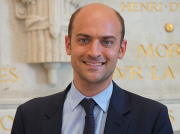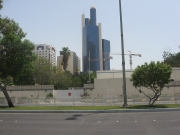
British Deputy Ambassador to the Netherlands Keith Allan reflects on his recent posting in Ukraine, and the role of the international organisations in The Hague in ensuring
accountability.
Today is Ukraine’s Independence Day, marking 32 years since the Act of Declaration of Independence was adopted. It also marks 18 months since Russia launched its illegal full-scale invasion with the aim of overthrowing Ukraine. It was a premeditated, unprovoked attack on a democratic sovereign state.
Putin thought he would overwhelm Ukraine in three days. He underestimated the resolve of the Ukrainian people, the skill and determination of their Armed Forces, and the world’s commitment to Ukraine’s independence.
Until about a month ago I was posted to the British Embassy in Kyiv; having initially been asked to go there for seven to ten days, Russia invaded and I stayed with the team for the next 18 months. Whilst I was there I felt the fear and exhaustion of nightly air raids that Ukrainians live with permanently. I met people who shared gruelling stories experienced throughout Ukraine and across the border, horrific results of this illegal invasion. Those witness testimonies stay with me and are a very personal reminder of why the international community must continue to support Ukraine in the face of Russia’s assault on freedom, and ensuring that those responsible for those heinous acts are held to account.
In Ukraine, the Office of the Prosecutor General had the UK’s support for their work investigating allegations of war crimes, building cases fairly, independently and robustly, to ensure those responsible are held to account. In my new role here I will support international organisations such as the International Criminal Court (ICC) in their complementary work to secure justice for what has occurred.
The UK and the Netherlands have together played a leading role not only in supporting Ukraine to win the war through significant financial and military assistance, but also ensuring there is accountability for the atrocities that have taken place. It is vital that we continue to support the effective and proper monitoring and documentation of human rights abuses. Not only to ensure perpetrators of these heinous crimes are brought to justice, but also to ensure evidence is collected from survivors efficiently to minimise additional stress and trauma.
I have seen first-hand the work of British and Dutch organisations who together are seeking to ensure such effective evidence collection. Earlier this year, the Justice Ministers of the UK and the Netherlands co-hosted an international conference in London, helping to ensure that the ICC has the resources it needs for its critical investigations. The international community, and the UK, is grateful to the Dutch for hosting the Register for Damages and the International Centre for Prosecution of the Crime of Aggression alongside other legal institutions in The Hague.
I have seen Russian aggression not only in my time in Ukraine, I happened to be in Moscow on the day Flight MH17 was shot down. At that time, I was serving as Consul General in St Petersburg. The UK is clear that Russia must be held accountable for this monstrous attack. And I was pleased to see successful prosecutions brought by the Netherlands earlier this year, despite the absence of the perpetrators.
The MH17 trial and process has shown that international justice takes time, it must be to ensure rigorous, fair, and effective trials. That is why we must be unrelenting in our support for the international organisations here in The Hague, to honour the brave people I met in Ukraine with justice, either in Ukrainian courts or here in The Hague.
So, I am proud to be able to continue to support Ukraine from here in The Netherlands. I wholeheartedly agree with Foreign Minister Hoekstra’s statement that accountability is of the utmost importance to ensure a sustainable peace. Justice for the crimes that have been committed will be crucial to rebuilding Ukraine, and some of that rebuilding has already begun. Earlier this year, the international community came together at the Ukraine Recovery Conference in London to unlock the potential of the private sector to help Ukraine’s economic recovery. This, in turn, will support the country to come back stronger, as a modern, stable and resilient democracy. Over $60bn in funding was pledged, and many Dutch business were among the 500 who pledged their support.
Over 20 countries, including the UK and the Netherlands have now also signed a Joint Declaration to provide long-term military support to help Ukraine win the war and strengthen its security in the long term to deter and defend against Russian attacks.
Ukrainians will always defend their land – as people in any country would. So there is no chance of a just and lasting peace unless it fully respects Ukrainian sovereignty and territorial integrity in line with the UN Charter and sees the departure of Russian forces.
We must hold those responsible to account, to ensure our world is one of freedom and democracy, not force and aggression. In the meantime we will continue to provide Ukraine with humanitarian, economic and military aid until Russia’s forces leave, which would be the quickest path to peace.
On Ukrainian Independence Day, I want to celebrate the strength, resilience and identity of the Ukrainian people that despite daily atrocities carry on with their lives.
In Ukraine, I saw the heroes of the country fighting every day for the values we share. We owe it to them to stand by their side for as long as it takes to end the war, to rebuild their country and to ensure justice is done. Photo by Guillaume Speurt from Vilnius, Lithuania, Wikimedia commons.







































